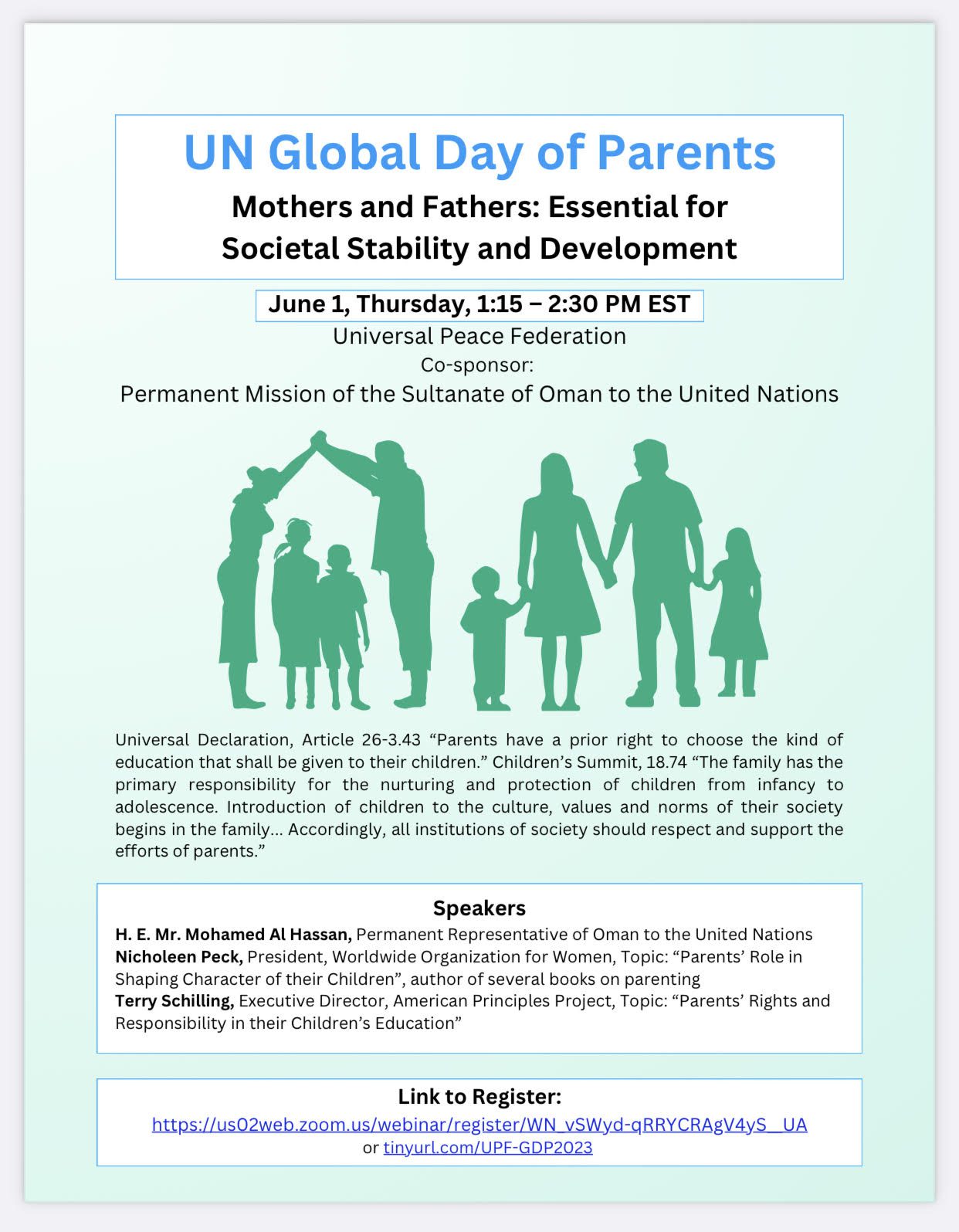There are times when I do things I wouldn’t normally do just because I wouldn’t normally do it. It’s a kind of self-check to make sure that I’m still open-minded and hopeful, instead of resting in a bias. Allow me to give you some context into my life so that you can understand why it was unusual for me to attend the new Barbie movie. I teach parenting, child development, and relationship-strengthening practices, I also head the Worldwide Organization for Women [WOW]. The WOW organization has been dedicated to the empowerment of women, girls, and families since 1977. Our organization is an NGO with consultative status at the United Nations. It is with 46 years of experience that we express sorrow at the current toxic feminist, even Marxist, messaging that is targeting females and undermining a hopeful, happy future for women and girls. In my role of advocating for women and girls on a global scale, I analyze everything to determine the cause of the effects I see in the lives of those for whom I am advocating.
Don’t get me wrong, I played with Barbies when I was young and some of our favorite cartoons to watch together on a family movie night when my children were young were the Barbie productions. So, I was skeptical, but hopeful when my friend called me and asked, “Do you want to dress in pink and go see the new Barbie movie?”
I said, “Sure! Sounds crazy, like something we don’t do. I like it.”
My friend must have known what I would get out of the show (she likely looked it up ahead of time as usual), because she said to me, “Nicholeen, I have a feeling that you’ll end up writing an article about this one.”
I laughed off her assertion and we joked that I should have paid for the ticket with the business card if it was going to be a business expense. Then we settled into utter disappointment.
My kind of movie is more like the recent Sound of Freedom movie or classics like The Sound of Music. If a production is done well and doesn’t push untruths, I can usually find something to appreciate in it. However, my family does know me as a pretty harsh movie critic when analyzing for: morality, social grooming, and truth. My children were called the same day I saw the Barbie movie to hear my review. They were actually shocked that I’d gone to that movie in the first place. I kind of was too. 😉 There is a part of me that loves to know what people see, learn, and think with each social trend. The psychological aspect of a movie trend fascinates me.
In light of all the social buzz about the recent Barbie movie, I feel that some parents might appreciate deeper analysis of common themes found in the Barbie movie that can negatively script today’s children. In my view, the new Barbie movie is toxic. It is an obvious vehicle of the anti-woman movement.
Many parents worry about what their little girls think of themselves. They see the mixed messages targeted at girls and women which are confusing, disempowering and alarming at best. These ideas are most accurately described as toxic. To say nothing about the messaging that is targeting the identity of men and boys. The consensus of activists seems to be that the threat to global happiness is “toxic masculinity” and “patriarchy.” Where does this messaging leave the future of men and women? Is it even possible to raise children who honor women and men in a world that has adopted stereotypical views of men and women?
The New Barbie Movie
Ironically, the new Barbie movie put out by Mattel, a toy company, seems to be trying to address stereotypes because the main character of the movie is named Stereotypical Barbie. Unfortunately, Mattel completely missed the mark. If they were attempting to unify society by exposing stereotypes – they failed. If anything, they seem to have created a deeper stereotype divide that will inevitably create more social division and disharmony amongst the sexes as our children grow into adulthood.
Even though the Barbie movie was entertaining, funny, and creative in some places due to some slapstick, ignorant, toy humor, it was ultimately a toxic production, especially for our youth whose brains are not fully developed, and individuals who don’t understand world views and the great happiness debate. The Barbie movie promotes: many forms of entitlement, self-absorbed men and women, disunity, objectification of men and women, a disregard for character development, contention along with passivity (ironically), parental immaturity, disrespect for a creator or plan from a creator, manipulation, despising maternity and babies, rejection of men, scurrilous depictions of manhood highlighted by buffoonery, and, finally, Marxism.
In a recent discussion with a colleague of mine, he said that the Barbie movie “might be, if you think about it, exposing how absurd modern feminism is.” After some discussion, I saw his point of view but concluded, that most audiences, especially juvenile audiences, who don’t scrutinize messaging when looking for entertainment, would never look that deeply into the production to see it as a backward view of why modern feminism is so toxic. On the contrary, most people are heralding the Barbie movie as a great step toward putting men in their place and strengthening women. Clearly, the movie gives the message that women must be aggressive and dominant to find happiness.
The Great Happiness Debate
Happiness, its importance, and how to achieve it, has been part of the great debate of civilization since the beginning of time. Happiness means “the agreeable sensations which spring from the enjoyment of good.” [Webster’s 1828 Dictionary] In order to understand happiness, we must also understand the word good.
Good means “having moral qualities best adapted to its design and use, or the qualities which God’s law requires; virtuous; pious; religious; applied to persons, and opposed to bad, vitious, wicked, evil.” [Webster’s 1828 Dictionary] The word God is actually the root word of the word good. To be good essentially means God-like. In that context, happiness means having a sensation associated with being in alignment with God, likely a spiritual sensation.
Happiness does not mean the same thing as pleasure, even though throughout history people have asserted that pleasure is the greatest indicator of happiness. This miscommunication about happiness has repeatedly led selfish or naive people down paths of emptiness, corruption, and self-destruction.
Epicurus, a Greek philosopher born in 341 BC, turned the meaning of happiness on its head by detaching happiness from goodness and associating it only with pleasure in his best-known egotistical hedonistic philosophy. He philosophized that the only thing that is intrinsically valuable is one’s own pleasure.
Other philosophers and prophets refuted these false Epicurean claims. Jesus Christ showed with His entire ministry and act of Grace that pleasure has nothing to do with the purpose and meaning of life. His life showed that joy, which stems from a deep spiritual connection and alignment with goodness, is most attainable through giving up oneself to/for another.
Since happiness is directly connected to God, it’s no surprise that anti-god philosophers continually suggest that God destroys happiness, because their definition of happiness is nothing but pleasure. I’m always saddened for people who think pleasure is happiness, because in my experience, I’ve found that pleasure is fleeting and often manipulated or exploited. Pleasure is a weak substitute for the security that comes from joy and happiness.
Jean-Jaques Rousseau, a philosopher and one of the fathers of the French Revolution was raised without much parental attention because his mother died and his father was absent. He expanded on Epicurus’s philosophical conclusions about pleasure and happiness. He declared religion “tyrannical”, pleasure and personal choice “king”, “equality through entitlement”, society “the enemy of the individual”, and rejected taking personal responsibility if it inhibited personal pleasure. This led him to take all five of his children to an orphanage so that he could pursue his own personal pleasures.
In the Barbie movie happiness is portrayed as partaking in the following pleasures: “every night is a girls’ night”, disconnection between men and women, expensive clothes, looking good, doing what you want to do, living in a dream house, driving a dream car, wallowing in your emotions or projecting them on others, controlling others to get your way, winning social battles and activism, and apparently going to the gynecologist (that one is disturbing on many levels).
Spoiler About What Spoils the Barbie Movie
What’s so toxic about Barbie? To be honest, it’s not just the Barbies or the women in the movie who are toxic. The Kens and men are toxic too. All the men and women in the Barbie movie are stereotyped, even the woman and her daughter who represent the real world and the solution for the Barbieland problem. Every character has an absence of character and is advocating for an ideological/activistic agenda.
Barbie may be a movie that was intended to show how all sides, of the socially constructed ideological battle of the sexes, are selfish and ridiculous. But, that would mean that Barbie is a movie only for adults who understand world views, -isms, stereotypes, and social programming. I don’t think most movie-goers fall into that category. I know they don’t because every time I share my findings about movies, people say that they didn’t see many of the things I saw, or that they didn’t want to think about the things I saw during the movie when they saw them; they just wanted to “enjoy it.”
For those parents who are intentional in their responsibility to protect their children from the evils of the world, here is a list of what Barbie teaches movie-goers and what should definitely be discussed with children if your children see this movie.
The opening scene shows girls playing with baby dolls and pretending to be mothers and looking bored. Then they see a larger-than-life sex symbol, Barbie, and they smash their dolls’ heads in and kick them and strip their own clothes off. It was disturbing. Children and those seeking entertainment could interpret this scene as promoting the idea that motherhood and babies are bad.
While we are on babies, there was a pregnant Barbie that was shunned by the community and always referred to as “gross” or “disturbing.” She didn’t ever have a say in anything but was just kind of tucked away. Also, the mother heroine in the story seemed to feel like motherhood and womanhood was a burden and led to “darkness.” What kind of a selfish message is this?
Mature families know that it’s family sacrifice that leads to our greatest joys and our greatest sorrows. Giving ourselves to family takes work and subordination of self but is ultimately our source of purpose and true happiness. The only thing this woman/mother gave to anyone was rhetoric about all the hard things about being a woman.
Her little activist speech which was portrayed as the hero moment of the movie, about how awful womanhood is, was meant to sound like all of this happened to her because of men. The thoughts she shared weren’t thoughts that a man would generally give. I work with lots of families. I’ve noticed that most women put expectations on themselves because of perfectionism or because they are comparing themselves to other women. More times than not, it’s the men who are telling their wives to “relax and not put so much on themselves.” The whole premise of the inner dialog was false, and saying such a negative dialog would only promote entitlement, not healing.
This woman was celebrated for her “darkness” thoughts, specifically, thoughts of dying. Instead of healing through hope, the movie showed her healing through anger and entitlement. That isn’t how a soul heals. Why would we want to promote indulging in “darkness?” That doesn’t sound like it leads to purpose at all. Talk about disempowering women. Sure, we all have hard times and can get caught up in our own heads sometimes. But, those are times to recognize our ability to identify thought problems and patterns and choose to adjust our thinking or seek help. This woman just gave her poison away. She didn’t adjust herself at all. This is personally and socially problematic. This immature mother character was morally bent. Her character could lead mothers to be selfish, which leads children to feel detachment from mothers in order for mother to pursue her self-interest, or worse that children had to save mother from her problems (dysfunctional), and she would teach men that a woman’s emotions are sovereign. This thinking is toxic.
Objectification and vanity are a big part of the Barbie movie. Barbie has to go on her expedition in order to make her feet and thighs look better. She is very afraid of cellulite! The cost and coordination of outfits is an important humor piece that promotes materialism and vanity.
Women, in the real world and in Barbie world are portrayed as objects. They are what they do. They don’t have any value outside of what they do for an occupation. Motherhood is noticeably not an option for Barbie to be a powerful woman. They have to look good and be perfect. To liberate themselves they have to focus on what they do and what they want, and then they change their looks. The movie massively objectifies women.
The men are also objectified. There isn’t one man that is shown as intelligent, and they are just there to hang around Barbie so that she looks like she has it all. Of course, when Ken turns to patriarchy, the objectification swaps for a minute, but it’s all just an objectification battle in the end, that no one can win because they are all being objectified and exploited.
Emotions are shown in a confusing light. When Barbie is happy it is shown as false and bad and when she cries or gets angry, then she is seen as good or normal. This makes good seem bad and bad seem good. This would be very confusing to immature, emotional, young girls who have a hard time sorting through their emotional ups and downs. It’s a negative, emotionally weak and entitled message. This isn’t to say that sadness or anger are bad. But, promoting them leads people to seek unhappiness in order to see themselves as normal. This is false messaging and goes against inner recognition of our capacity to handle problems or to choose optimism.
Several characters in the movie make references to their genitals or lack of genitals as dolls. For example, Barbie doesn’t feel complete without a vagina. So, at the end, after a slightly blasphemous, confusing, and misleading conversation with her “creator,” she happily goes to the gynecologist. There is a disturbing moment when a middle school-aged girl tells Barbie that she doesn’t have anything to worry about at the gynecologist. Why would a middle school-aged girl know this or say this? What are we promoting here? Sexually active teens? And, why is Barbie going to the gynecologist if she has no interest in Ken or men? Is it because she intends to be sexually active? Is this the happy ending that Mattel is offering to young girls? Sexual grooming anyone?
We can’t have a movie about Ken and Barbie without some love, or can you? It used to be that Ken and Barbie were a couple. They went on dates and got married. I had a wedding dress for my Barbie and Ken had a suit. My Barbies always got married. But, in this movie Ken loves Barbie, but she doesn’t want him. So, maybe there is another guy she likes. Nope, she is all for herself. The movie promotes solo living and pushing away relationships.
Every movie that ends this way bothers me because it turns the purpose of humans and happiness upside down. Sure, not every romance in real life ends in marriage, but there is a reason that good stories end in marriage; why it’s the universal sign of a happy ending. Stories that are repeatedly copied, like Cinderella and the Jane Austin Romances are copied because people love the build-up to marriage: the happy ending.
In his book Manhood, Josh Hawley gives some great understanding of what marriage really means to society. Hawley says, “If a man wants to meet his purpose as a man, then he will have to give himself away to a woman and bind himself to her. He will have to sacrifice. He’ll have to acquire the character of a husband…Marriage was viewed as foundational to a good life. Today our epicurean age teaches a different message…it is a truth the one can only become one’s self by giving one’s self to another.”
Modern men have been trained in epicurean thought, and so live for pleasure. What does this do to women? It further objectifies and disrespects them. But, then society tells them that they are bad for wanting pleasure from women. This results in women feeling that men are objectifying them, even if, like Barbie, they are objectifying themselves, and then women retaliate by pushing men away and getting hostile. Epicurean women want their pleasure too, so they emotionally abuse the men. No one gives themselves to each other and they all lose. That is where we find ourselves and what the messages in the Barbie movie will lead to. Each person is just living for themselves. Epicureans would call this a successful culture. But, we see, even from Barbie, that this just creates an oppressor/victim culture. Happiness, if undone, fractures the family and a life of purpose: the foundation of real happiness.
Men and women gain great purpose through each other and through marriage. Hawely says, “In love we do the opposite from what Epicureans council. We surrender ourselves to love another. That is what men and women were meant for…To love and commit your life to another is to open your life to pain, hardship, and misunderstanding. Love means embracing the hard stuff too.” Marriage teaches us to endure life, instead of just looking for a scapegoat to blame for what is not perfect enough yet.
Yes, the men in the Barbie movie behave badly. The depiction of men is definitely exaggerated at best, but mostly stereotypical and falsified for effect. They aren’t behaving as good men. A good man is respectful to women and children. They provide for, protect, and preside over their home and family with gentleness and kindness. The bad behavior of these men seems to justify Barbie’s retaliation. However, Barbie was conceited toward Ken first. Even though in her conceit she seemed pleasant, where Ken was gruff in his retaliation. Barbie didn’t value Ken as a person. She was selfish and exploited him, just like he exploited her. No amount of manipulation will solve the exploitation of men and women in our culture. Only love can heal that problem.
Finally, the housing situation is concerning in Barbieland. I know they were being literal about the Barbie toy line. I guess Ken didn’t really have a toy house released for him. Probably because it was assumed that they’d live together. So, all the Kens in Barbieland are homeless. They really want a home, but the Barbies all have their own mansions and don’t want Kens in them. “Every night is a girls’ night” they say. When the Kens do their patriarchal takeover, they take over the houses. This is significant since they are homeless. It’s interesting to note that neither the Kens nor the Barbies really seem genuinely happy living alone. They do stuff each day, but it is obviously empty living.
Josh Hawley said about home, “The real feeling of home represents what the husband and the wife have built together in that place. In that place husband and wife, together, endure.” He explains that that is the reason why going to his grandparent’s house was always so special to his heart and why he wanted to have a home with a woman. There is a presence in a real home where people have sacrificed for each other that can’t be felt elsewhere; it’s a feeling of security and safety. Our children need to know that homes are better when we share them. The selfish messages in Barbie will lead to homelessness, even if people live in their own mansions.
Toxic Culture End Game
The sad news about the Barbie movie is that more and more people are embracing Mattel’s version of happiness; selfish loneliness focused on pleasure seeking. In contrast, focusing on family at your house, disengaging from the battle of the sexes, celebrating the magnificent order that the ideals of marriage and family bring to the world even if you are a single parent or have been wronged by the opposite sex, can give the rising generation a counter message to what Hollywood is peddling. Our children’s hearts and identities are under attack. We must discuss more with our children and proactively prepare them for the cultural ideological grooming that they are and will continue to encounter throughout their lives.
When the Barbie movie ended, I noticed that there wasn’t applause or even smiles. There was just silence in the theatre. I saw children holding Barbie dolls and parents silently stand up and walked out. The feeling was thick and awkward. It was as if I could hear parents thinking, “What do I do with this experience? Will they forget it? Will they even see what I saw? Was it so bad? Should I just focus on the funny stuff? Are men really that bad? Is that the way women should handle men who act that way? Why is this happening? Why is this the message given to our children?”
I felt bad for those parents. I don’t usually write such long articles, but this time I felt like I wanted to help those parents who left with their heads down and in silence. It’s okay that you felt awkward. It’s probably a sign that what you saw wasn’t true or shouldn’t be true. It’s okay to tell the real truth to your children. Please do. Please talk about it. Ask the questions above to them and discuss the themes.
The Bible says that there is always what is seen and what is not seen, “for the things which are seen are temporal, but the things which are not seen are eternal.” [2 Corinthians 4:18 KJV] I believe this verse applies to movies too. Look deeper and talk about what is seen and what is not seen with your children. Discussing deeper is good parenting. These discussions with your children could potentially be liberating too. The last thing we need is a society of loveless, selfish, angry, pleasure-seeking people who don’t value anyone but themselves. We can teach our children to see more and be more; be family.
Improve conversation with your children by having regular mentor sessions.












